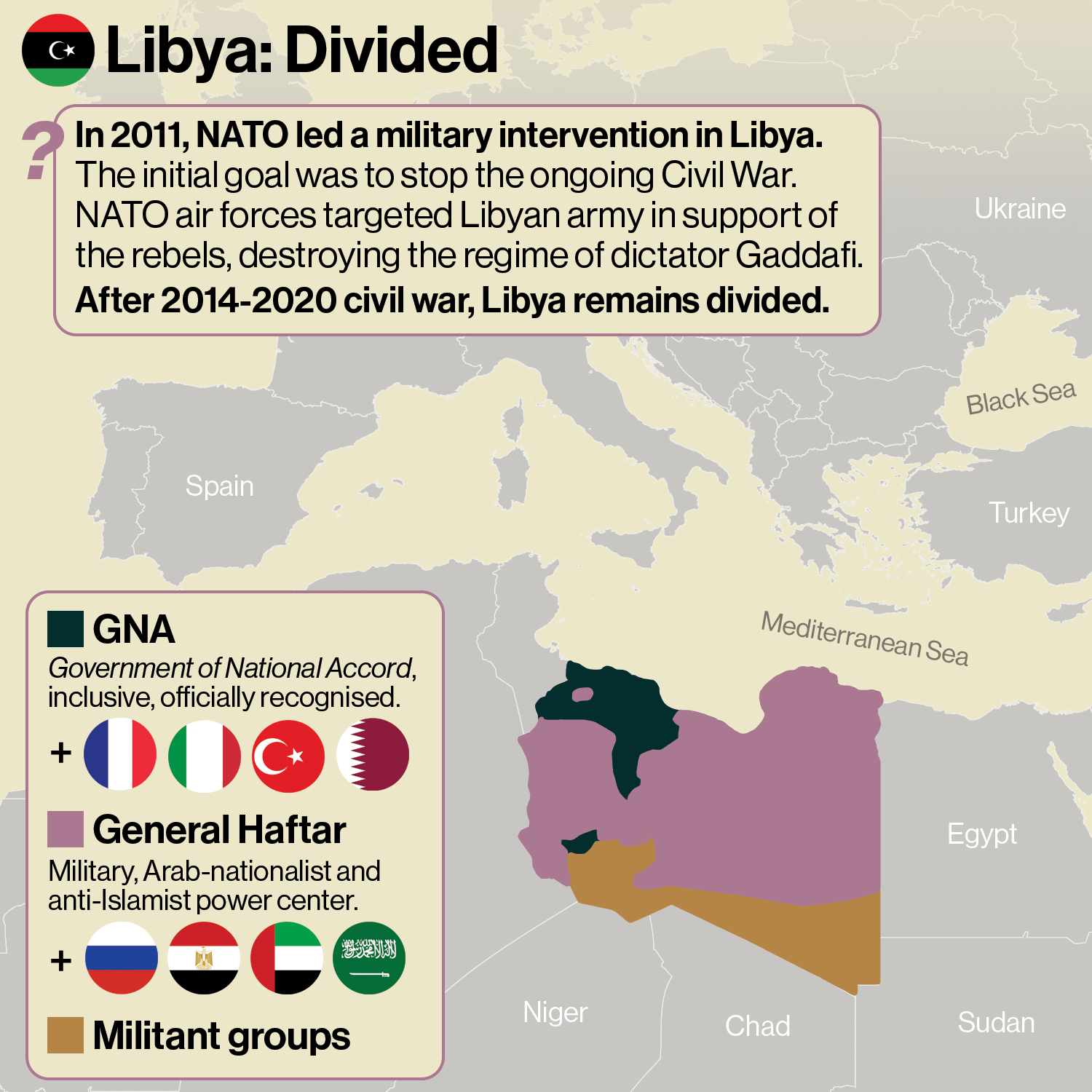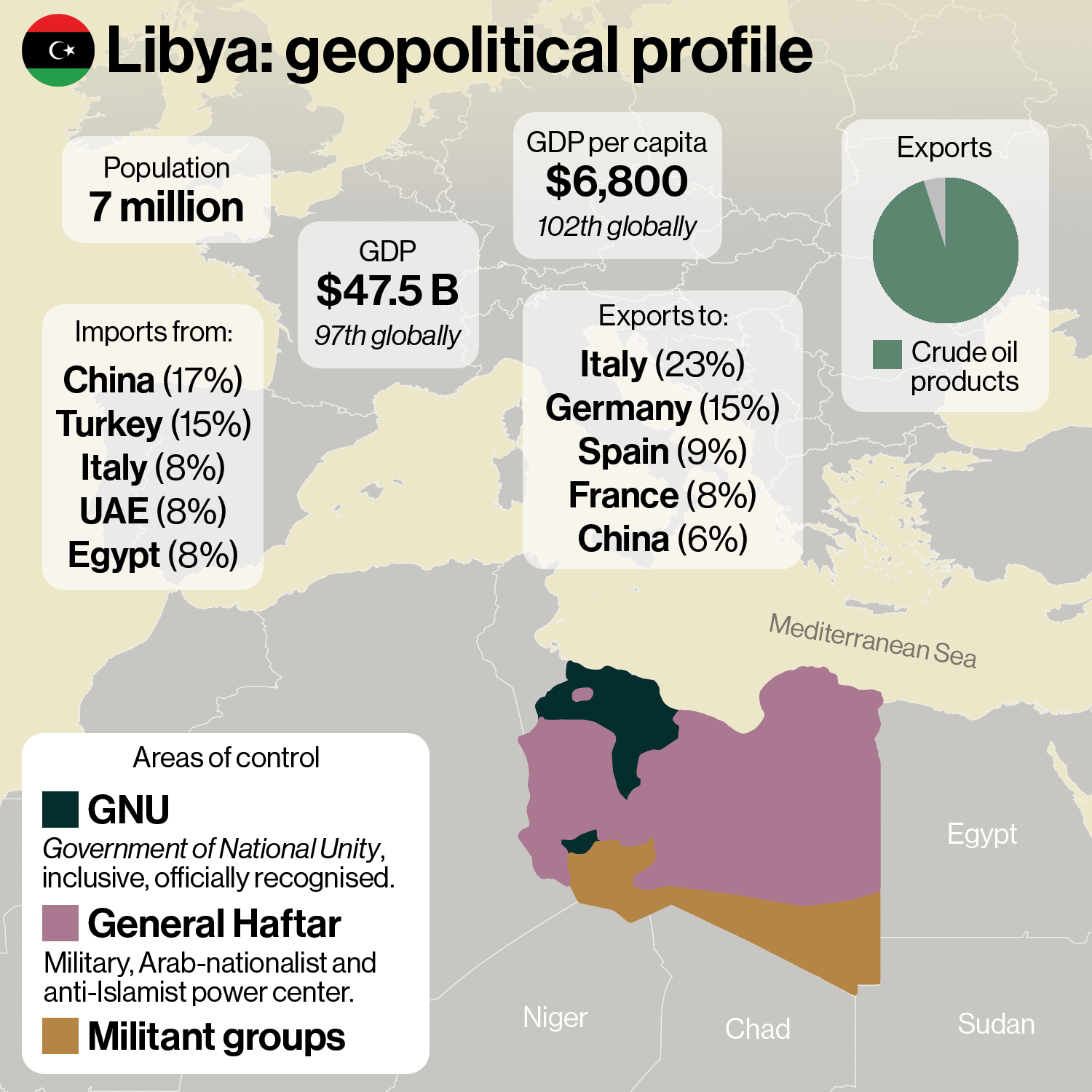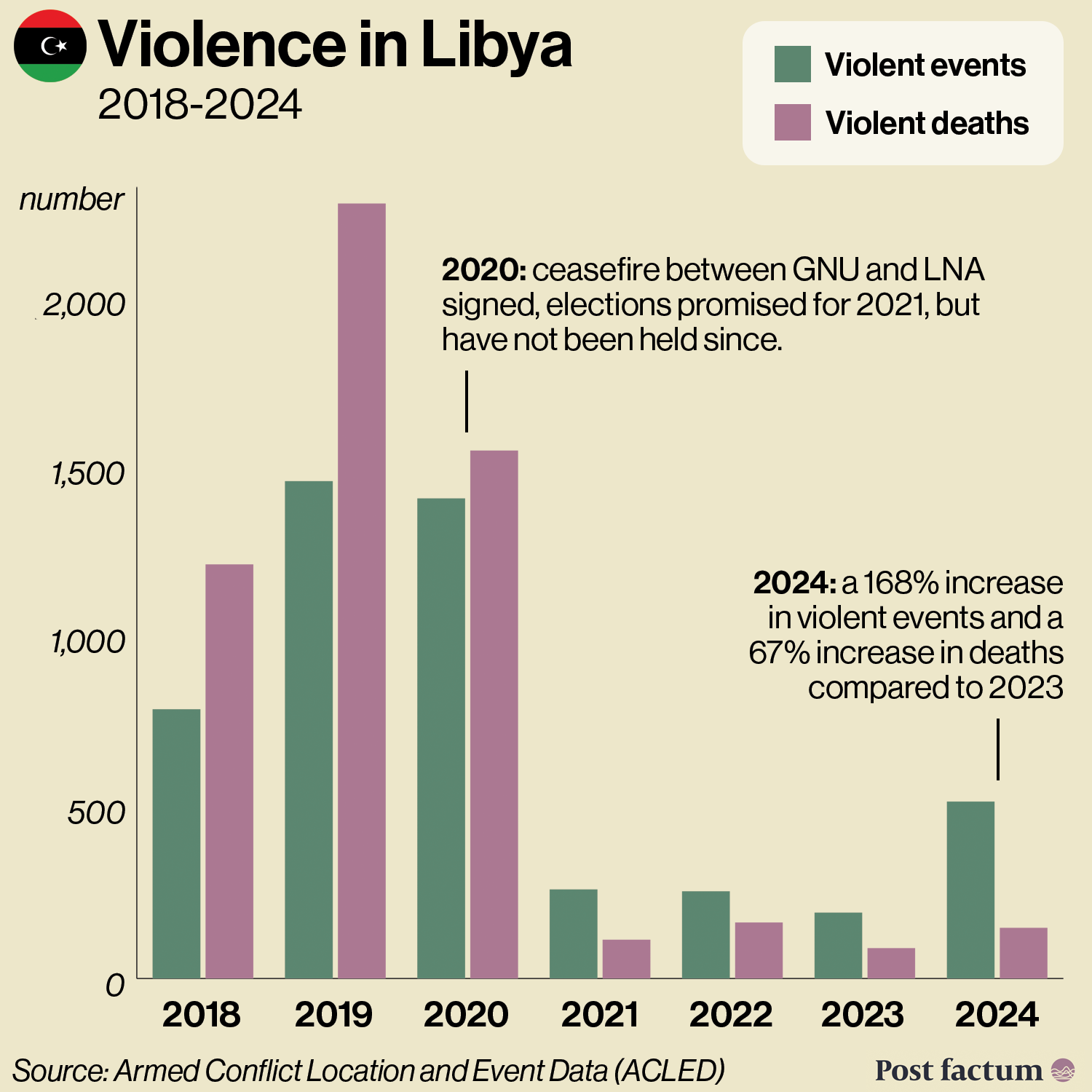Libyan Crisis, explained
July 20, 2025
2011 NATO intervention ended the dictatorial regime of Gaddafi.
Libya remains divided between two governments in 2025.
The country holds 8th largest oil reserves globally.
Muammar Gaddafi was the dictator who ruled Libya for 42 years until he was killed by rebel forces in 2011, during the wider Arab Spring protests.
In 1969 he led a revolution against the Libyan king, establishing a republic. His political success later grew into a personality cult.
Gaddafi forced the nationalisation (government ownership) of Libyan oil industries, renegotiating the exploitative oil contracts signed during a period of monarchy following independence from Italy.
Gaddafi used Libyan oil wealth to fund a range of ambitious projects over the next decades, from social programs to military invasions, while making the economy dependent on oil exports.
He was known for his:
Anti-imperialist stance: countering the influence of the US and the global West in Libya, Africa and the Middle East.
Human rights violations, including killings of political opponents, war crimes and crimes against humanity.
In 2009, a civil war started in Libya as disappointment with Gaddafi’s regime grew.
In 2011, the UN Security Council authorised a NATO-led intervention in Libya to force a ceasefire. However, this operation transformed into the bringing down of Gaddafi’s regime.
Gaddafi was killed by the rebel forces during the war. The collapse of his dictatorial regime left a power vacuum (no strong political authority to stabilise the country).
After a period of instability, Libya fell into another civil war (2014-20). A ceasefire was signed in 2020, but the country remains divided between two authorities (governments).
Western Authority:
The Government of National Unity (GNU) is allied with a network of militias that control the resources and territory of western Libya, including the capital Tripoli.
The situation in Tripoli is unstable: the GNU reportedly competes for control over state institutions with these armed groups despite their alliance.
Eastern Authority:
The Libyan National Army (LNA) is a de-facto (not legally recognised, but real) authority that has gained power in eastern Libya, formed by Gaddafi-era military personnel, armed groups and foreign mercenaries. It is led by General Haftar.
The LNA currently supports the Western Authority although their relations remain tense, as LNA controls a lot of Libyan oil production, while GNU has legal recognition.
Geopolitical interests in Libya have created a complex set of alliances between the two competing authorities, militant groups and foreign actors.
Despite relative stability since 2020, democratic elections (originally planned for 2021) keep getting delayed as the two governments have failed to reach an agreement.
Libya has the largest oil reserves in Africa, holding around 40% of the continent’s total. It has the 8th largest reserves globally, on par with the US.
Today, Libyan oil represents:
68% of its GDP
95% of its exports
90% of state revenue
The overreliance on oil exports has made Libya’s economy sensitive to changing oil prices and prone to internal conflict.
The two civil wars (2011 and 2014-20) disrupted oil operations as well as slowed exploration and development.
Oil weaponisation
The rival governments and their allied armed groups compete for control over oil production. They also use it as a weapon to bargain with or damage their opponents.
During a dispute between rival governments over control of the Central Bank, the Eastern Authority blockaded oil fields which led to a 60-70% drop in production in August 2024. This caused estimated losses of $50-70 million per day. Production began to stabilise once both authorities reached an agreement in October 2024.
Constant internal conflict discourages foreign investment, which limits the development of the oil industry.
Brief history
After the fall of Gaddafi in 2011, a UN-backed government was tasked with unifying the country and disarming militias who fought in the war, but it failed to stabilise the political situation.
A second civil war broke out in 2014:
In May 2014, the LNA led by General Khalifa Haftar launched a campaign targeting Islamist militias in eastern Libya, taking control over parts of the country.
Growing violence led to another nationwide civil war as the rival governments and their allied armed groups established control over land.
Parliamentary elections held in June 2014 saw just 18% of voters turnout due to security concerns and boycotts, raising questions about the legitimacy of the results. The opposition party won.
The ruling party rejected the election results, forcing the opposition to relocate to eastern Libya and ally with the LNA, creating the current east-west divide.
Central authority collapsed during the second civil war, creating a power vacuum that was filled by armed groups.
The two competing governments allied with these groups to secure control over territory and resources, and to strengthen their own military power.
Armed groupstransformed from militias into major political stakeholders, becoming part of key public institutions such as:
Central Bank and financial institutions
National Oil Corporation
Interior Ministries of the two rival governments
Local and municipal governments, replacing public sector officials
Intelligence and security services
They obtained political power through intimidation and violence, accessing public funds (especially oil revenues) and achieving some degree of formal legitimacy..
A UN-brokered ceasefire was reached in October 2020. The agreement ended the second civil war, but the east-west divide between rival authorities continues.
Violence in Libya has seen an increase recently.
The most severe fighting seen in years broke out between armed groups in Tripoli in May 2025 after the assassination of a militia leader.
The global importance of Libya
Interests in Libya’s strategic location and its oil reserves drive intervention from foreign actors:
Location: Libya sits between Africa, Europe, and the Middle East, making it an important Mediterranean trade hub. It also borders 6 countries in North Africa and the Sahel.
Energy production: Libya plans to increase its oil production to 2 million barrels per day by 2028, relying on international support for tech, management and access to global markets.
Potential: 65% of its waters and 70% of its land remain unexplored for oil. An oil licensing round was announced in March 2025 aiming to attract international investment.
Foreign actors are competing for access to Libya’s oil while securing alliances with the rival governments and armed groups to increase regional influence.
This has exaggerated internal divisions as military and economic resources pooled into Libya to support competing factions.
Who backs the Western Authority?
United Nations (UN)
The UN acts as a mediator to enable a Libyan-led political process. Its official objectives are to help achieve peace, to establish unified democratic rule, and to secure sustained economic development in Libya.
In 2015, during the civil war, a UN-led deal established the Government of National Accord, recognising it as the legitimate national governing body. However, the war between the rival governments persisted until 2020.
In 2021, a year after the ceasefire, the UN facilitated the creation of the interim GNU to replace the previous Western Authority and to prepare for national elections that have still not been held.
France and Italy aim to maintain access to Libya’s oil. Additionally, France wants to keep its influence in North Africa and the Sahel, and engage in counterterrorism, while Italy is interested in managing migration flows to Europe from Libya.
Turkey
Since the second civil war, Turkey has maintained a presence in Libya (currently 3,000 personnel) that has allowed it to gain influence in the Mediterranean region:
In 2019, Turkey signed a maritime deal with the Western Authority that created a sea corridor between the two countries, giving Turkey access to contested waters in the eastern Mediterranean and the oil reserves (known and unexplored) that lie within it. This increased tensions with Cyprus, Greece, France and Israel.
Between 2019-2020, Turkey sent troops, advisors and key military equipment such as drones to the previous Western Authority to help them resist an LNA attack in Tripoli.
Turkey’s role in this defensive operation was reportedly decisive in freezing the conflict and preventing a takeover by the eastern government.
However, Turkey started engaging with the eastern government and the LNA after the war, especially since 2024:
Turkey plans to open a consulate in eastern Libya (Benghazi) in mid-2025 to strengthen diplomatic and economic ties with the Eastern Authority.
The son of the LNA leader recently met with officials in Turkey to discuss weapons purchases and military training.
Turkey is positioning itself as a mediator and influential player in Libya by engaging both rival authorities to strengthen its political, economic and military ties while protecting its energy and maritime interests in the Mediterranean.
Qatar
Qatar has played an increasingly important role in its alliance with the Western Authority, providing financial and diplomatic support, as well as promoting military cooperation.
This financial support has supposedly been sent to the western government, but also to its affiliated Islamist militias, which Qatar also supports.
Qatar’s presence in Libya is linked to the goal of limiting the regional influence of its Gulf states competitors: UAE and Saudi Arabia, who are allied with the Eastern Authority.
Who backs the Eastern Authority?
Egypt
Egypt supports the LNA to secure the border it shares with Libya.
For Egypt’s autocratic military government, Islamist militias in Libya have posed a national security threat since the Libyan crisis started.
Egypt declared its support for the LNA and even made public threats to the western government. During the second civil war, Egypt launched strikes targeted at Islamic State fighters in Libya.
In January 2025, the Egyptian president hosted the LNA leader and called for “all foreign forces” to be expelled from Libya.
Russia (2,000-2,500 personnel, “Africa Corps” ex-Wagner)
Russia uses its influence in Libya to maintain military presence around an airbase near the border with Chad, Sudan and Egypt. It also holds access to an eastern port.
These positions are strategic locations that give Russia a base of operations in the Sahel and Mediterranean regions.
Russia has deployed its mercenary "Africa Corps” to Libya (previously part of the Wagner Group that has been reorganised after an attempted coup in Russia in 2023): 2,000-2,500 personnel.
Russia also looks to get a new diplomatic ally in case the Eastern Authority takes over and becomes the recognised government, especially in the face of partial international isolation Russia faced after the invasion of Ukraine.
Russia provides military equipment and training to the LNA, and backs it militarily with the remainder of the Wagner mercenary group that supported this faction during the second civil war.
In May 2025, the LNA leader visited the Russian Defence Minister to deepen the countries’ military relationship, including joint exercises and intelligence sharing.
United Arab Emirates (UAE) and Saudi Arabia
UAE and Saudi Arabia have common objectives in Libya. Both countries look to weaken Islamist armed groups that support the western government and to limit regional influence of Turkey and Qatar.
UAE provides support in the form of military, political and financial aid. It has intervened militarily in Libya to favour of the LNA:
UAE allegedly launched 850 strikes between 2019–2020 that targeted western government forces and their allied Islamist militias.
As Turkey increased its regional involvement in 2020, UAE targeted Turkish military equipment at a Libyan airbase, reportedly resulting in Turkish casualties.
Saudi Arabia’s engagement with the eastern government comes in the form of financial aid to support military operations and diplomatic support, aligning with UAE and Egypt’s regional interests.
Author Lisandro Diaz Villarruel
Editor Anton Kutuzov
Join the discussion:




